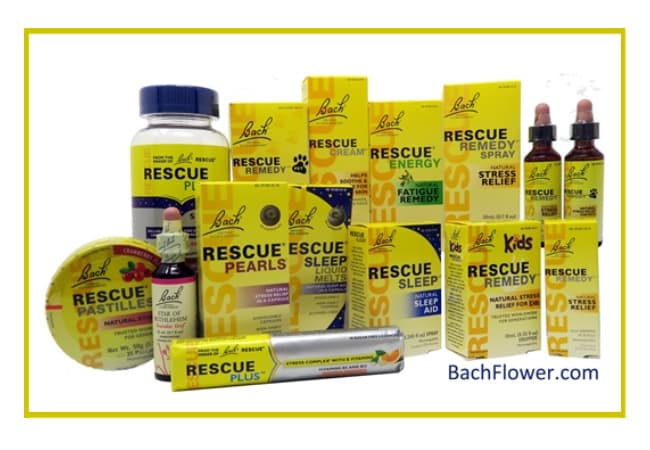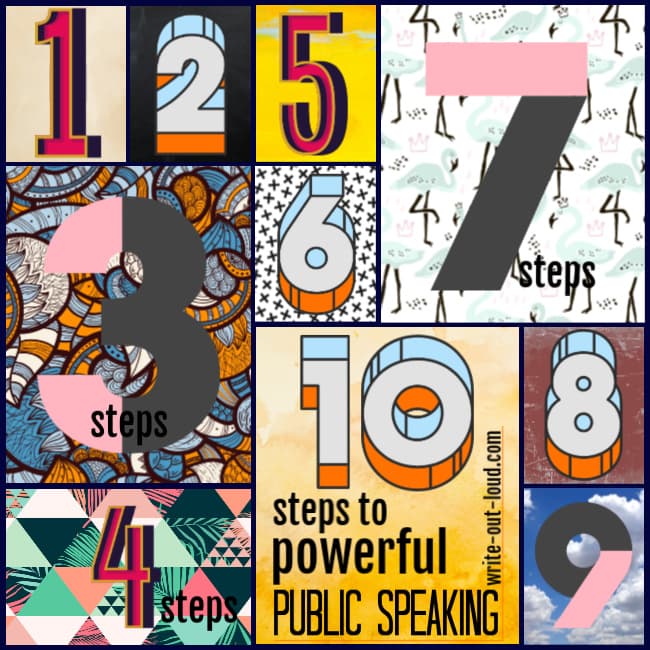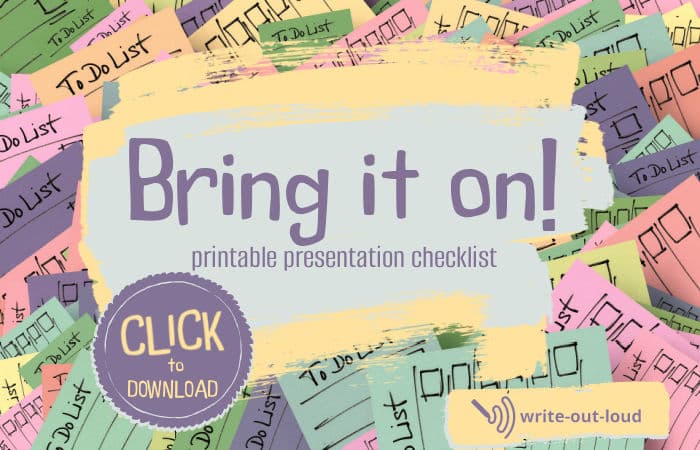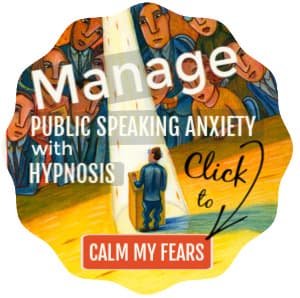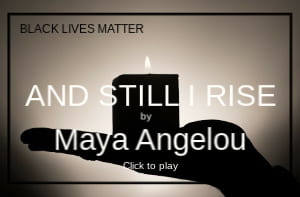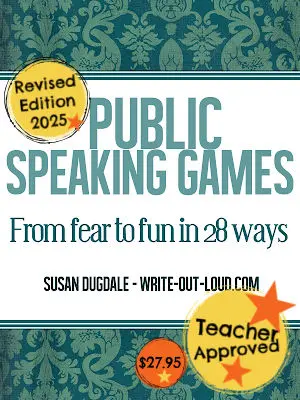- HOME ›
- Public speaking fear ›
- Acute anxiety help for public speakers
Acute anxiety help for public speakers
14 effective ways to manage public speaking fear
By: Susan Dugdale
Here are 14 different ways to help manage public speaking fear.
Some you can put into practice immediately. Others are longer term solutions.
I've used them myself and know they may be just what you need.
How to get the most from this article
This page is long.
(Actually, that's an understatement. It's extremely long because it's an important topic, and there's a lot to share on it.☺)
Take your time.
Use the jumps links below to find out more about a strategy, including how to adapt them for children.
Pick one, two, or three suggestions, and then mix and match them to meet your situation.
14 ways to manage public speaking fear
- Breathe well. This is essential. You can not manage how you feel without first managing your breathing. Start here.
- Reality checking. How to put fears in perspective.
- Avoid alcohol. Why having an alcoholic drink to calm yourself is not a good idea.
- Using imagination positively. How and why to create powerful pictures of yourself doing well.
- Get a support person. Have someone on your side.
- Eating well. Understand what foods to eat and what to avoid.
- Be present. Learning to focus on the task to hand: to be 'in the moment'.
- Success recall. Remembering to remember previous successes and acknowledging them.
- Get professional help. Learn to recognize when you need to ask for assistance from a qualified professional.
- Natural remedies. Try well known natural remedies for stress and anxiety.
- Hypnosis. Hypnosis has a long history of being used to help manage fear and anxiety.
- Check your planning. Ensure you know exactly what you need to succeed.
- Use music. Playing the right music can lessen anxiety.
- Practice congratulating yourself. Learn to actively acknowledge steps towards success.
How to adapt these tips for children. Six strategies to put in place straight away.
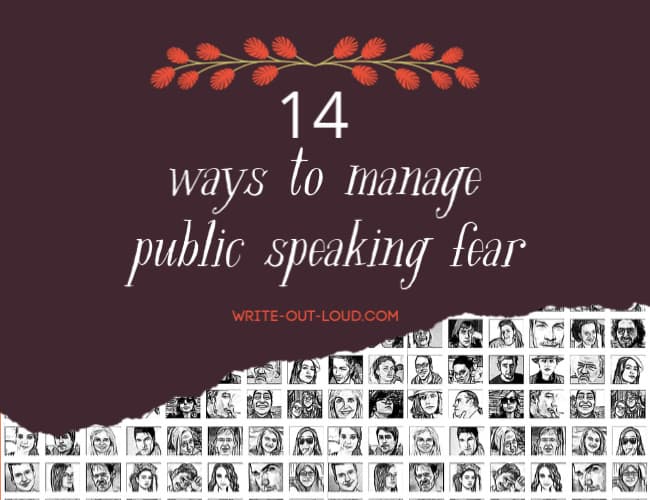
Yes, I used to be terrified of public speaking too!
You have my sympathy because I know how public speaking anxiety feels.
There were times I despaired. My hyper-active imagination and jumpy nervous system used to join hands to leap and caper in a furious dance. I remember standing in the wings of the stage waiting for my cue to go on feeling sick and terrified. I knew I was going to throw up, forget what I was going to say...
Fortunately that response to speaking in public is mostly history. I have what I call 'normal' responses these days.
It's normal to feel excited about going to perform: give a speech, read a poem aloud, lead a workshop...
Interestingly, the side-effects of eager anticipation are similar to being fearful. Like for instance being so excited that we forget to breathe, or can't eat.
The difference is that they are not so intense that they become immobilizing.
What works best for me is breathing properly, managing negative self-talk, genuine* preparation and practice: lots, and lots, of it.
(*Genuine - not merely thinking or worrying about it but actively and thoroughly preparing and practicing.)
Read my suggestions below. Select those that are the most appropriate for you and, put them into action.
1. Breathe well
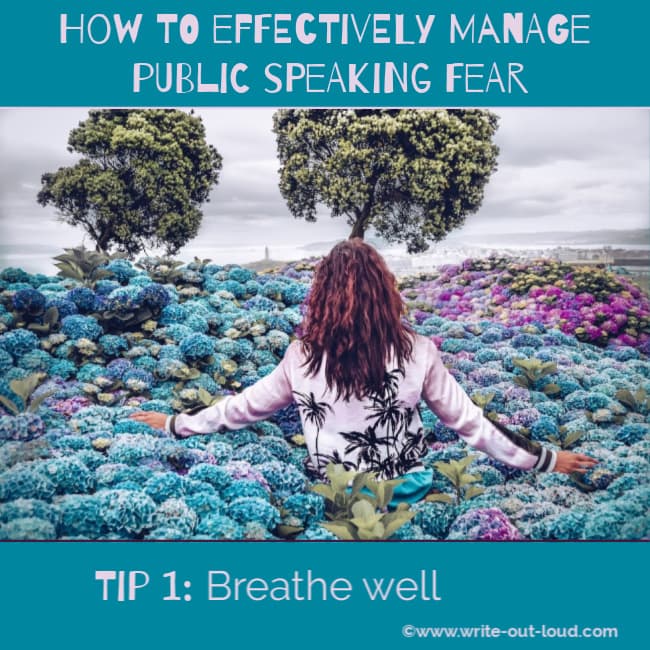
Breathing sounds too simple to be effective, doesn't it? However breathing properly, or fully, works.
When we're extremely anxious we tend to either hold our breath or breathe very shallowly off the top of our lungs. The result is we prolong and heighten the physical discomfort brought on by acute anxiety.
(For more on the impact of shallow breathing on health and well-being please see this article: Posture and Breathing: The Physiological effects of Shallow Breaths.)
You could short circuit the consequences of breathing poorly now.
How to breathe well instructions
- Stand up*. Place your feet a shoulder width apart and put one hand on your belly.
- To begin breathe out through your mouth, expelling all the air from your lungs.
- Then breathe in deeply, through your nose, using your diaphragm. As you do imagine the breath coming in through the soles of your feet and traveling all the way up your body to the very top of your head while mentally slowly and steadily counting to four. You will feel your diaphragm lift.
- Hold the breath for a moment before releasing it through your nose, again to the count of four.
- On the out-breath, imagine all the negativity and anxiety draining away from your body. Feel it leaving: flowing out of you from the top of your head all the way down to your toes.
- Repeat the in and out breath to the count of four at least four times.
- When you've finished shake your arms, wriggle your shoulders and let the feeling of ease settle in.
- For a variation try increasing the count to five or six. Try closing your eyes to help you to focus better.
Color your breathing
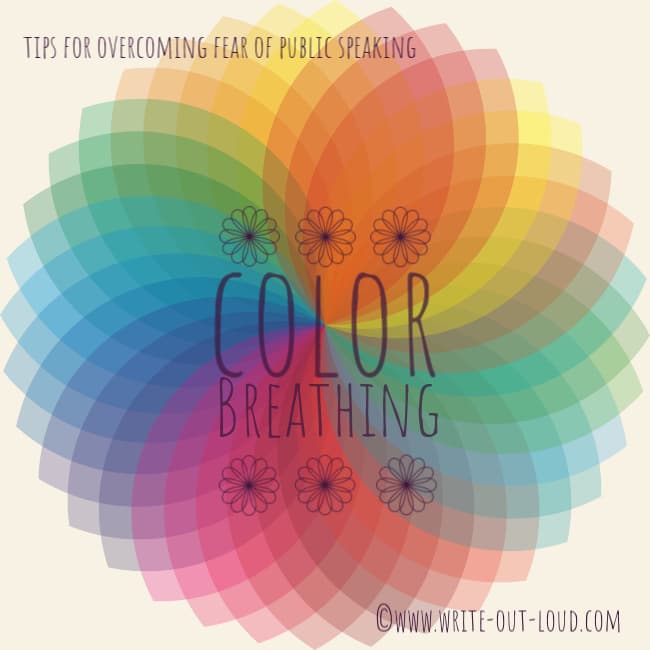
As an extension 'color' your breath in your imagination.
Choose a color to invigorate and cleanse you. Soak yourself in it. Feel the color flowing through every cell in your body on your in-breath count, bringing with it all the special qualities you associate with it. And then on the out-breath see and feel the color washing all the negative energy you've been carrying away.
(For more on the attributes or qualities of particular colors and using color in meditation read UK therapist Victoria Weatherer's article: Colour Breathing Meditation ~ A simple technique)
Please note: You'll know when you're breathing correctly because the hand you've placed on your stomach will rise and fall with your in and out breaths. If it doesn't move, try breathing more deeply until it does.
* If circumstances prevent you from standing, do the exercise sitting. Be sure to sit 'square' in your seat. Uncross your legs. Place your feet on the floor, straighten your back and let your arms rest comfortably in your lap.
You'll find extensions to these breathing exercises here.
2. Reality checking
In the midst of a crisis irrational fears may take over. Often they are quite without foundation. These fears thrive in the mental muddle and deep murky underworld of stressed minds. They can not survive in the clear light of factual truth.
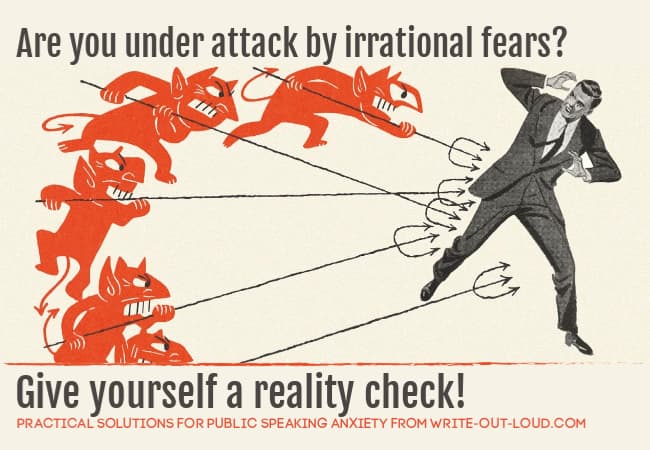
Take a moment to ask your sensible adult grown-up self, (not the part of you behaving like a very frightened child), some searching questions and LISTEN to their real or rational answers.
- Are you mistaking the ordinary adrenaline rush of excitement for fear?
It can easily happen because the symptoms of both are similar: heightened sensitivity, butterflies in the stomach, increased heart rate ... - Have you prepared carefully? That is: have you practiced your speech? Is it the right length for the time allowance? Have worked out how to handle your notes properly? Do you need a rostrum? What about volume? Etc, etc ...
- Have you 'survived' this type of feeling before?
If you have confused excitement for fear and answered YES to the last questions do a deep breathing round and let the irrational thoughts and feelings go! You do not need them.
3. Resist using alcohol to settle your nerves
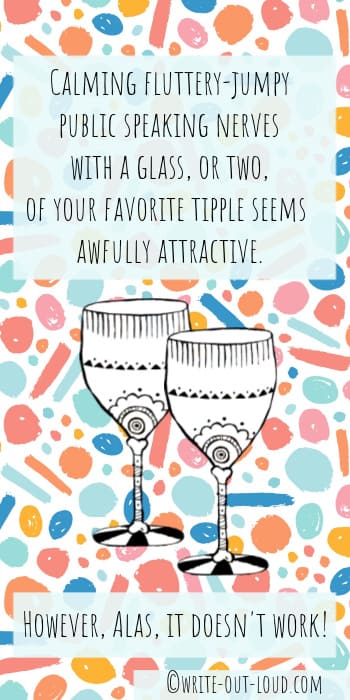
Alcohol is not your friend in this situation.
Recent research results indicates that alcohol may calm your fluttery - jumpy nerves but it also blunts your ability to respond quickly, appropriately and to clearly evaluate your own performance.
In other words, you may feel better but actually do worse.
For more read:
Alcohol May Help Your Speech Anxiety but Not Your Speech | How Alcohol Reduces Anxiety
an article from realmenrealstyle.com
The research cited:
Stevens, S., Cooper, R., Bantin, T., Hermann, C., & Gerlach, A. L. (2017).
Feeling safe but appearing anxious: Differential effects of alcohol on anxiety and social performance in individuals with social anxiety disorder. Behaviour Research and Therapy, 94, 9-18. Link: http://www.sciencedirect.com/science/article/pii/S0005796717300864
Save the glass of wine for later!
4. Use your imagination positively
In your mind put together a slide show - huge multi-colored vibrant pictures of yourself doing well.
See yourself at ease. See yourself performing beautifully. Make the images as detailed as possible.
Now add sound, smell, feel...

Use all your senses to create an outstanding movie in your mind featuring yourself.
See yourself before the presentation, poised and alert. See yourself during it: responding to the audience with ease, if there's a question and answer session handling queries competently, and see yourself afterward reflecting on a task done well.
Play that slide show/movie whenever you feel anxiety beginning to tighten its grip.
And remember to breathe!
5. Ask a NON-indulgent, understanding friend to be your support

Sometimes we get so knotted up inside having someone who cares for and understands us alongside is a great help.
Tell them their chief task is to keep you on track. They may understand your anxiety but they are not to heighten it by playing into it.
They are there to remind you to breathe, to see yourself as successful and be of practical, sensible assistance.
Their first job is to banish anybody adding to your stress unnecessarily.
6. Eat lightly

Heavy food in a delicate stomach makes you feel even more stressed. Say no to fast fatty foods, and anything with a high sugar content or that is caffeinated.
Also say no to anything you have not eaten before just in case it does unpredictable things. Bloating, belching, or a case of diarrhea is an added stress you can definitely do without!
Eat light, easily digested, foods about an hour or more before you are due to present. Or if you can't eat anything, take a nourishing drink, like a banana smoothie.
Bananas have been my preferred before performance food for a long, long time. I was delighted to learn relatively recently that they have been found to contain natural beta blockers which minimize symptoms of anxiety. That made perfect sense to me!
For more on foods that reduce stress read this healthline.com article: Are there natural beta blockers?
7. Be in the moment

Potential cringe alert!
I am giving you fair warning. 'Be in the moment' is one of those truisms - a cliche, a saying of the sort many people, myself included, often want to sneer, snort at, and dismiss contemptuously. (OMG - so meaningful! So deep! Snigger.)
However, a saying becomes a cliche for a reason. And that is because it expresses something both commonplace and, true.
When you are 'in the moment' your mind is not racing ahead filling itself with all sorts of concerns about what might, or could, happen.
Instead you are focused on what it is you are doing now and carrying out that activity to the very best of your ability. This makes you alert and responsive.
To help you stay in the 'now moment' practice breathing fully. Use the rhythm of good breath control to anchor you there.
8. Success recall
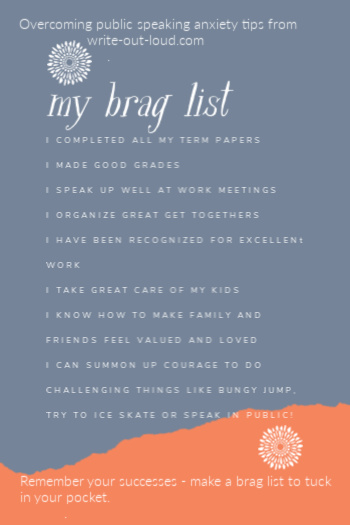
One of the best antidotes to anxiety is to remember previous occasions when you felt, and were, successful.
The more vividly you can recall those times the more effective they are.
The situation doesn't have to be the same as the one you are preparing to meet now.
The most important aspect of this exercise is experiencing yourself as a success and remembering in as much detail as you can how that felt.
If you have time prepare yourself a 'brag' list on a small card. Put on it your most significant personal triumphs.
Now put the list in your pocket. When you feel 'wobbly' you can slip you hand in to feel and remind yourself of them.
Because being acutely anxious is totally consuming our past successes slide from memory. A touchable reminder brings them back, helping restore balance and perspective.
9. Seek professional assistance
See your doctor to discuss symptoms and solutions. You will know when the situation has gone beyond self-manageable limits. Don't be too proud or frightened to make the call.
There are many, many people who can not solve this on their own. You are not alone. Ask rather than suffer in silence.
Be aware that although there are drugs to lessen the intensity of your experience, taking them is a short term solution. However, if it's an emergency this could be just what you need to get you through your present situation.
The doctor will also advise whether your discomfort is the result of physical illness rather than extreme anxiety. I know from experience when you're in the midst of an attack sometimes it is hard to tell the difference.
10. Try natural remedies for stress and anxiety
There are many herbal and other natural remedies available either through a regular drug store or specialist natural health outlets.
One of the most commonly used is Bach Flowers Rescue Remedy. It contains a mix of five different flower essences and is especially formulated to combat the effects of extreme stress.
I always have a bottle on hand for anyone suffering either first night play nerves or pre-speech anxiety. And as you can see, it's available in different forms.
Other common natural calming aids are special aromatherapy mixtures (which generally include lavender) and herbal teas. Varying mineral (for instance magnesium) and vitamin supplements may help as well.
Ask for assistance from a suitably qualified person to help you get what is most appropriate for you.
11. Hypnosis
Hypnosis is a totally natural and normal process which will allow you to work positively with the negative thoughts and feelings underpinning full blown anxiety.
What is the difference between using hypnosis to entertain, or to heal?
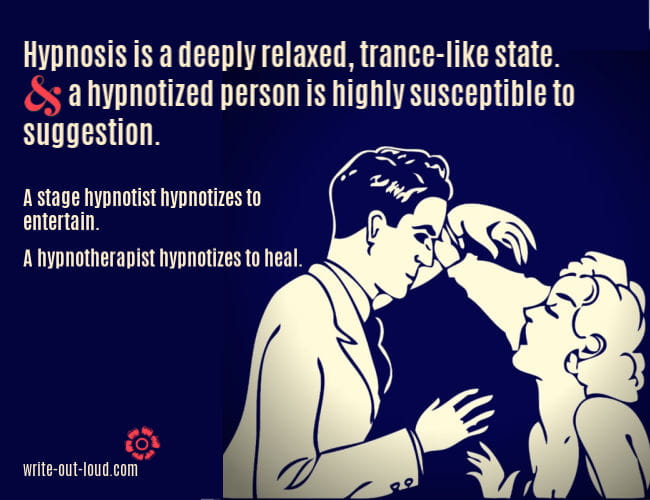
Essentially to be hypnotized means to be in a deeply relaxed, trance like state. When a person is in this state they are very open to suggestion. What is suggested depends entirely on the result wanted by the hypnotist.
Articles about hypnotism in our media are often about what a stage hypnotist does for entertainment.
As part of a show some audience members will willingly allow themselves, at the suggestion of the hypnotist, to behave in extraordinary ways. They'll squawk like a chicken, bark like a dog, or passionately kiss the stranger next to them, much to the delighted horror of everybody watching.
That is precisely the result a stage hypnotist is looking for.
However it is not how a professionally qualified therapeutic hypnotherapist works!
A qualified therapeutic hypnotist is NOT an entertainer
Trained hypnotherapists do not 'rob' you of your dignity, will, and awareness. They work with you. These people are not show men. They are there to help you take back your life and live it as you want to.
Sometimes one or two sessions is all it takes to reverse self-limiting habits.
I've personally found it very useful when I decided to tackle a couple of deeply ingrained self-sabotaging behavioral patterns. (Not public speaking fear, but cigarette smoking and all the nonsense self-talk that goes into sustaining the habit!) It made the process of freeing myself much, much easier.
Finding a hypnotherapist
You have two options.
Option one - receive help the traditional way
Seek out a good hypnotherapist near you and set up a series of traditional face-to-face sessions. You'll go to the therapist's clinic for assistance on a pre-arranged date and time.
Option two - receive online help
The second option is to download audio and other materials from a hypnotherapist's site and use them when, and where, you choose to.
If you prefer the second option because it's more convenient, easier to manage, and cheaper, I recommend using hypnosisdownloads.com.
(The link will take you to their 'About' page where you can read about the people running the site, their philosophy, check their testimonials, and so on.)
Look and you'll see they are an ethical company founded by reputable hypnotherapists.
Among their many programs they have an excellent one called 10 steps to powerful public speaking which covers everything you need to tackle, and overcome public speaking fear.
Find out more by clicking the link, or the image below.*
*In the interests of clarity you need to know that when you buy '10 steps to powerful speaking' I receive a portion of the purchase price for introducing you to the product.
12. Re-check your planning
Go through the 'little' details as these can be the things which in the end cause the most stress, simply because they are overlooked.
How are you getting to the venue? What do you have to take with you? Has the presentation space been checked?
Prepare everything well ahead of time so you arrive with nothing to do but speak.
To help, download a useful printable preparation checklist from this page featuring 9 keyways to prepare for a presentation. It covers many of the items that you can reasonably expect to have had to consider as part of getting ready to give a speech or presentation.
I call these 'Bring-it-on' lists and can't function without one when I have a presentation coming up. For me, they're an absolutely essential part of dealing effectively with public speaking nerves.
13. Play baroque music to soothe your nerves
Did you know music composed around four hundred years ago has been proven to calm anxiety? That music is called 'baroque' and was written between 1600 -1750 in Western Europe.
It's likely you've already heard of three of its most well known composers: the Germans, Johann Sebastian Bach and George Frederic Handel, and the Italian; Antonio Vivaldi.
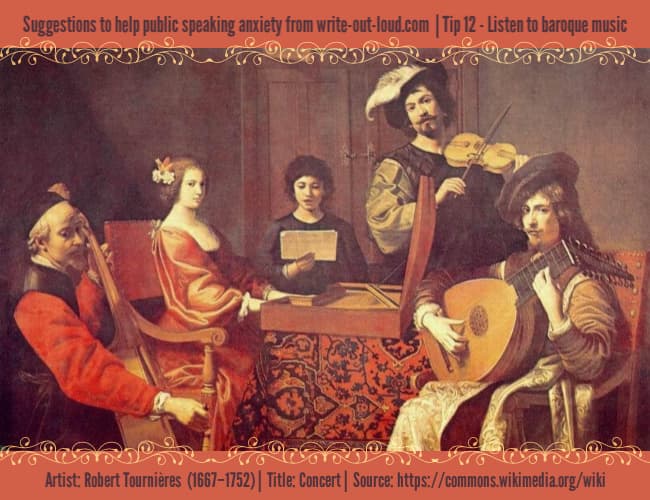
The patterning or structure of baroque music has been proven to both enhance learning and to soothe by inducing a therapeutic change in people's brain waves.
Get yourself some Bach, Handel or Vivaldi and start listening!
Use these links to find out more:
- Baroque music for relaxing, studying and learning - 2 hrs of varying composers on YouTube. A great place to begin.
- The Baroque music’s influence on learning efficiency based on the research of brain cognition - a conference paper presented at The 35th Progress in Electromagnetics Research Symposium, August 2014
- Music of the Baroque - an in-depth site covering the period and its composers
14. Congratulate yourself
You're here reading this page. That means you're actively looking for solutions and that takes courage.
It also takes courage to put yourself out as a performer of any sort in the first place. So you are a doubly courageous person, the sort who will seek what they need to do and do it.
Don't wait. Hoping it will go away doesn't help either. Waiting and hoping add to your anxiety and out of control feelings.
Use the time you have positively. Choose at least one suggestion and begin using it now!
How to adapt these tips for children
If you're reading this page on behalf of a child, you'll find many of the suggestions useful. They adapt well across age groups and, children will respond very quickly if given clear instruction and support.

I suggest using the breathing exercises first. (You'll find those back at the top of the page.)
Teach them how to do them, and then help them establish a routine of using them daily.
I've taught these breath exercises to children, teenagers and adults to help them deal with examination nerves as well as first-night play or speech jitters and I know they work. Try them and see.
Use a natural anxiety remedy
The Bach Flowers 'Rescue Remedy', especially formulated for acute anxiety, is a good one too. It's easily given and has no nasty side effects. That's number 10 on my list above.
Put together a comprehensive checklist
Use tip number 12 and help the child through all the organizational steps needed to make their presentation/speech successful:
- Have they got their notes? Are they in a good, readable format?
- What's the sound system like in the venue? Can you get in some practice with it prior to the event?
- Do they know the right time of the speech?
- How are they getting to the venue?
- What else do they need to take? Water bottle? Props? Any official forms?
If the child is distressed avoid escalating it. If you allow yourself to become upset it will feed theirs. Keep calm, even if it's only outwardly and do a set of breathing exercises for yourself.
See and remember successes
Go through positive visualization exercises with them. Help the child to recall instances of success and build on them. (Tips number 4 and number 8 above.)
OMG! How awful!
Banish un-helpful hysterical friends who want to magnify the situation, to play up the drama of it all. Your child doesn't need the distraction.
Secret signs and signals
If you can, and if it helps, station yourself where they can see you from their position at the venue. Have an unobtrusive 'remember to breathe' signal worked out, so you can remind them if you see them getting anxious.
Help the child gain perspective
Above all, help them put whatever they are doing in perspective. (Tip number 3 above - reality checking)
How critical is this event on a scale of 1-10? Ten is total disaster. What will happen if the worst occurs? What will happen if the best occurs?
Helping a child get their response in proportion to the event's real importance will help them control it. This is an empowering lesson, one that will give them confidence and faith in themselves.

About the Author: Susan Dugdale, founder of write-out-loud.com, is a qualified teacher of English and drama with over 40 years of experience. Drawing on her professional expertise and her personal journey from shyness to confidence, Susan creates practical, real-world resources to help people find their voice and speak with power.
